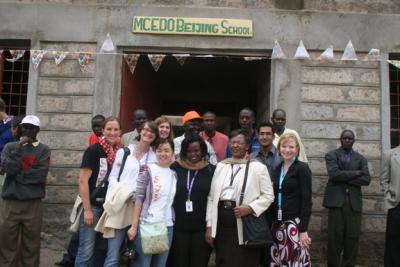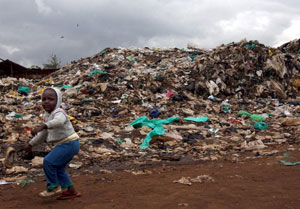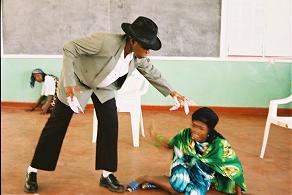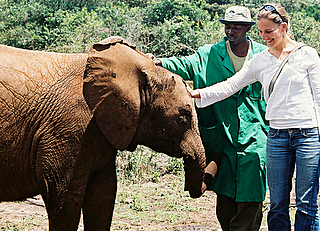MCEDO-Beijing School Opens in Mathare Valley

YEP! members, United Nations staff, Mathare residents, students and teachers gathered at the Mathare Community Education Development Organization (MCEDO)- Beijing School on 26 June for the official opening of the school that will serve 250 students, including many orphans, in the Mathare Valley slum.
By Caitlin Sanford
The Executive Director of UNEP, Mr. Achim Steiner, the Ambassador of the People's Republic of China, H.E. Ming Zhang, His Worship Ferdinard Waititu, the Deputy Mayor of Nairobi, and Mr. Benedict Kiage, the head teacher, all delivered speeches at the opening. Mr. Steiner highlighted the importance of involving UN staff from the Nairobi duty stations in local community projects. Mr. Zhang spoke of his commitment to continue supporting the MCEDO-Beijing School, and encouraged students to continue their studies, mentioning scholarships offered for Africans to study in China.
As the major donor, the Chinese Government provided US$ 25,000 to MCEDO for the construction of the new school building, which consists of nine classrooms, a computer room, a staff room, a storage room, and a kitchen. The new school building will eliminate high rent costs formerly paid by the all-volunteer run school. Numerous other donors supported the project, including the World Food Programme, which is providing meals for the students during the school week. YEP! members recently planted a bamboo grove to add some greenery to the school grounds, with seedlings donated by ICRAF.
YEP! (Youth Empowerment Programme!), the volunteer network of interns, consultants and staff serving at the United Nations in Nairobi, has been supporting MCEDO since August 2005. YEP! member Claudia Hasse said that procuring electricity, water, and registering MCEDO-Beijing School as an official school are the next steps. "I hope this school will be sustainable and will begin securing its own income in the near future" Claudia said.
For more information, including on how to donate regularly via your monthly payroll, please see http://yep.unon.org or email yep.nairobi@gmail.com.
benundclaudia - 4. Jul, 11:37



 Über 3 Millionen Elefanten gab es einmal in Afrika, heute nur noch etwa 250.000. Da die Menschen mit den Tieren beim Kampf um Land und Ressourcen im Wettstreit stehen, sei es nicht ungewöhnlich, dass die Elefanten vielen Bedrohungen durch die Zivilisation ausgesetzt sind. Zudem habe auch Kenia eine traurige Geschichte hinsichtlich der Elfenbeinjagd. Der Sheldrick Wildlife Trust setzt dem ein beeindruckendes Engagement entgegen. Vor allem durch Kontakte zu den Nationalparks würden junge, durch Wilderer teils brutal verwundete Elefanten in das Waisenheim gelangen. Inzwischen wurden dort mehr als 75 erfolgreich aufgezogen.
Über 3 Millionen Elefanten gab es einmal in Afrika, heute nur noch etwa 250.000. Da die Menschen mit den Tieren beim Kampf um Land und Ressourcen im Wettstreit stehen, sei es nicht ungewöhnlich, dass die Elefanten vielen Bedrohungen durch die Zivilisation ausgesetzt sind. Zudem habe auch Kenia eine traurige Geschichte hinsichtlich der Elfenbeinjagd. Der Sheldrick Wildlife Trust setzt dem ein beeindruckendes Engagement entgegen. Vor allem durch Kontakte zu den Nationalparks würden junge, durch Wilderer teils brutal verwundete Elefanten in das Waisenheim gelangen. Inzwischen wurden dort mehr als 75 erfolgreich aufgezogen. Im Gespräch mit den Betreuern der Babyelefanten erfahren wir, dass die Kleinen nach ihrer Ankunft einige Tage bräuchten, um sich an die neue Umgebung zu gewöhnen und um Vertrauen zu den Pflegern aufzubauen. Neben natürlicher Nahrung, die sie auf dem sehr weitläufigen Gelände finden, bekommen die Babys mehrmals pro Tag und in der Nacht spezielle Milch aus der Flasche. Generell werde jedoch versucht, so wenig wie möglich in die natürliche Entwicklung der Tiere einzugreifen. Langfristig müssten sie auf die Reintegration in die freie Wildbahn vorbereitet werden. Der Kontakt zu Menschen sei bewusst gering, daher auch die Besuchszeiten des Heims auf täglich eine Stunde begrenzt.
Im Gespräch mit den Betreuern der Babyelefanten erfahren wir, dass die Kleinen nach ihrer Ankunft einige Tage bräuchten, um sich an die neue Umgebung zu gewöhnen und um Vertrauen zu den Pflegern aufzubauen. Neben natürlicher Nahrung, die sie auf dem sehr weitläufigen Gelände finden, bekommen die Babys mehrmals pro Tag und in der Nacht spezielle Milch aus der Flasche. Generell werde jedoch versucht, so wenig wie möglich in die natürliche Entwicklung der Tiere einzugreifen. Langfristig müssten sie auf die Reintegration in die freie Wildbahn vorbereitet werden. Der Kontakt zu Menschen sei bewusst gering, daher auch die Besuchszeiten des Heims auf täglich eine Stunde begrenzt.